By: Izumi Hasegawa February 4, 2024
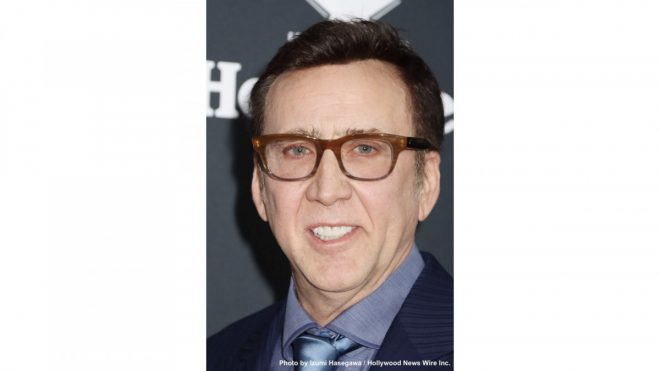
Nicolas Cage, whose father is an university professor, now plays one himself in his latest movie, Dream Scenario. If he could be a college professor, what would he teach? What is his wildest dream/nightmare?
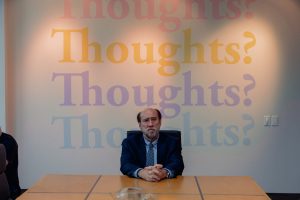
Q: What was the best part of sort of like playing in this fantasy wish fulfillment and sometimes nightmare fulfillment?
Well, the best part for me right off the bat was the title. I just love those words. Two my favorite words combined dream and scenario. It just sounds so good together “dream scenario.”
And then I read the script. And I have to say it was one of the five best scripts that I ever read and doing this for I guess over 42 years. The other ones were Raising Arizona, Leaving Las Vegas, Vampire’s Kiss, Adaptation, and Dream Scenario. And I knew right away I just had to make the movie I just had to do it. I felt like I had the life experience to play Paul. I don’t look like Paul. I don’t sound like Paul. I don’t move like Paul that was all by design to create a difference between my presentation and the character. But what had happened to me virally really, I think I might’ve been the first actor, and maybe it was 2008, 2009, who woke up one morning and made the mistake of Googling himself and just saw this mashup called “Nic Cage Loses As You Know What”. And it was just cherry-picking all of these sorts of crisis moments of different characters that I had played without any regard for the narrative or how the character reached that point. It just became what I call, I guess I coined a new word, memefied. And I was like, I don’t know what’s happening to me. And I couldn’t stop it, I couldn’t control it. There was nothing I could do. It just started growing exponentially and compounding on itself. And then it went into like, you don’t say memes and t-shirts. And I thought, boy, I don’t know what to do with this. But when I read Dream Scenario, I thought, yeah, I could apply that experience to this person because people are dreaming about him. I mean, he has no control over that either. So behind the character, the design of the character, the voice, the movement, the look, was genuine emotion. And I’ve noticed that lately, I wanna get more personal with my work. It’s like, I wanna find characters that I can take the life experience like Pig or now Dream Scenario and kick it into high gear, switch into glide and not feel like I have to act too much, like get that real feeling. So like the apology video, I felt like I meant it. We just like, that’s how I felt when I saw these viral mashups. So that’s really what put the hook in me. And anytime you’re doing a movie, which doesn’t happen often, but a movie about dreams on some level, I feel like it changes the physics of the narrative because you can deal, you go into dream logic. A lot of Japanese horror films like Ringu or The Grudge have a kind of dream logic sensibility and I’m a fan of those kinds of movies. And I thought we could play with that here as well. So a lot of thought and a lot of excitement went into it.

Q: Sometimes the apple doesn’t fall from the tree. Your father was a professor of literature and here in this film, you get to portray a professor. Can you describe how interesting that profession is and if given the chance yourself to lecture what topic or subject matter would you be interested in educating people about?
Well, the thing about Dad, you know, is he loved his students. He was the sort of teacher who was very inspired and excited by the idea of encouraging imagination and art in his students. But I also saw his, you know, academia, you want to talk about competition. Forget about sports. The world of academia is very competitive and everyone’s trying to outsmart the other person on the staff and in within the University of itself. So I did see him contending with some frustration with that element about academia. But the relationship he had with his students was always poignant and exciting for him. And I think they genuinely loved him. And that was important. I wanted to play Paul as someone who was a good professor, that he really did want to make that connection with the students. If I was to teach, that’s a good question, because my path or the way I’ve chosen to see myself is as a student. And I would never call myself a master or a professor. I prefer to think about things and look at things as a student. Which if you look at my filmography carefully, that answers a lot of questions. Because, you know, I did things that people said I had no business doing. Like you can’t be in adventure movies. You don’t look like an action hero. But I thought, well, you’re right. I don’t. But maybe I’ll learn something. So let’s try it. And I was always, you know, excited about what we could do with film performance. You’re not just get stuck in that what seemed to be a cycle of 1970s naturalism that everyone got latched onto. I was far more excited by the films of Billy Wilder and, you know, like Double Indemnity and Edward G. Robinson and Fred MacMurray or Barbara Stanwyck. I like that rhythm and that music that they had. I want to bring that more into the mainstream or into the current. Or even go even more abstract with surrealism within film performance. I felt like what you could do in one art form, why couldn’t you do it in another? I believe in art synchronicity that if Picasso could do that or Warhol could do that, why not try out a film performance, see where we could go. But always with the belief that if you had genuine emotional content behind the designs of the characters that it would still communicate with the audience. So that’s a long way to say I don’t know what I would teach because I’m a student. I’m looking for something, but I might teach how to be a student.
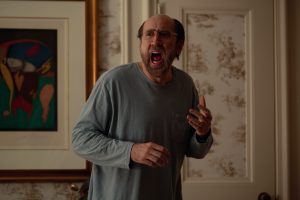
Q: Having grown up before social media and the internet. What do you think it says about today’s society that a normal person like Paul Matthews can be built up and taken down so quickly?
I think it’s what it says is speed. People said, well, this was what you signed up for. But I didn’t. When I made the decision to become an actor in movies, I was thinking about people again in the 40’s or Cagney or the 20’s, you know, all the way back. They didn’t have everybody with a cell phone and a camera, and they didn’t have the internet. So for me, it was an adjustment. It was an adjustment to the viral world of the internet, which I didn’t sign up for that. That just happened through the course of having done this for over 40 years. But I think there’s a great graphic novelist named Alan Moore. He did The Watchman and there’s a documentary about it. Yeah, there’s a documentary about Alan Moore, The Mindscape of Alan Moore. And in that, he said, I wanna look at the exact year, ’cause he had an exact year. Like he’s almost like a Nostradamus. Like this is the year where information is gonna be deployed so fast that we’re all gonna turn to steam. And I don’t know what that really means, but there’s something about it that has a kind of visceral sound to it. It’s like information is speeding up exponentially and everyone’s kind of having this collective, like Jung (Carl Jung, psychiatrist) said, collective unconsciousness and we’re getting it, it’s sort of happening through technology. So it’s still something that’s evolving, but it’s here and it’s here to stay. Well, he had written a script that I was trying to get off the ground. It never happened, but this was even before the internet became the internet. And it was about the internet. It was very prescient of him. He was talking about how all this information was gonna be dropped on the internet and everybody’s life was gonna change instantaneously.
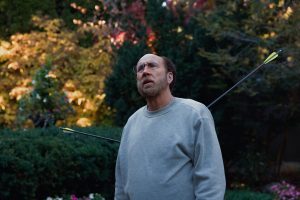
Q: What is your personal relationship with dreams? Do you believe they have deeper meaning though?
The fantasy in me want to believe they have a deeper meaning, but the scientist in me doesn’t think they have a deeper meaning, but I like the magic of dreams. The way I choose to look at them, whether they’re nightmares and I’ve always had dreams, like even when I was little, my dad said I was plagued by nightmares, but I sense subsequently learn how to utilize them because what I like to think about dreams as gifts. Let’s say I have a plane crash dream and I’ve had recurring plane crash dreams and it’s terrifying and it’s so real and I wake up and I go, you know what this does for me? This makes me have compassion. I have compassion for folks that have been through that experience or have not survived that experience. And it makes me more compassionate within the community. Like you have a dream about something happening as someone you care more when you wake up. Or sometimes I don’t know how to play a scene and I go to bed and I’ve had a dream and I just, wow, I’m going to use that in the scene because there’s a residual lingering feeling there that is enigmatic and undefinable, but it’s somehow, it’s giving me something to work with to help play the scene truthfully.
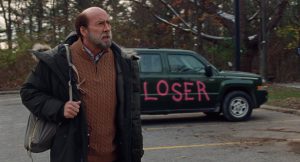
Q: Last year you played a version of yourself in the movie, The Unbearable Weight of Massive Talent. Could you comment on a possible connection between that movie and Dream Scenario in the sense both deal with the theme of fame, particularly your fame, and the ubiquitous of your persona?
Okay, so specifically Paul Matthews in Dream Scenario is not so-called Nic Cage. It’s not me, it is not meta. I’m gonna just go on record. It’s not a meta experience. The only thing that I think people might be thinking is meta is where we’ve been talking in the media cycle about how I’m trying to find movies where I don’t feel I have to act as much because I feel like I’ve had the life experience to play the character, to inform Paul Matthews. That’s very different than The Unbearable Weight of Massive Talent. The Unbearable Weight of Massive Talent is hands down the scariest thing I’ve ever had to do in the 40-plus years of making movies. There was no muscle in my body that said, “Oh, I wanna play a character.” And by the way, that character’s name is gonna be Nick Cage. All of us actors wanna hide behind a character. That’s not me, man. That’s not what to say. No, you’re going out there and you’re going to be you’re going to be you. And I was like, well, that’s not me. You know, that’s not, I don’t have it. Well, I have a daughter now, but I didn’t have a daughter at the time. I’m not someone that wants to choose a career over family. My family comes first. It’s very important. But the director Tom Gorrmican was like, well, yeah, but then we don’t have a story. We have to get this a story. So every step of the way of that movie, because I also know I was making fun of myself. I was making fun of myself. And it’s humiliating. It’s like, what are you doing to me guys? What is this? Is this like a Saturday Night Live sketch? I don’t want that. And but thankfully, Tom and Kevin (Kevin Etten), the writer and the director, they wanted to tell a story that had some heart. But that was, that was a highwire. I never want to do anything like that again. There will be no The Unbearable Weight of Massive Talent 2 that won’t happen.
Edited by Tiffany Le / Hollywood News Wire Inc.
